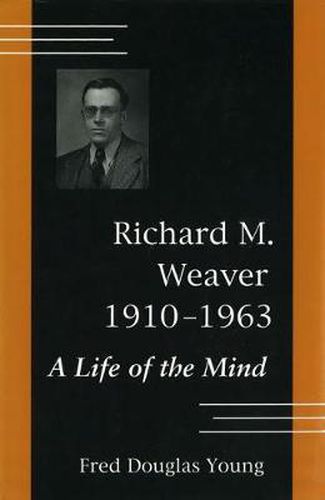Readings Newsletter
Become a Readings Member to make your shopping experience even easier.
Sign in or sign up for free!
You’re not far away from qualifying for FREE standard shipping within Australia
You’ve qualified for FREE standard shipping within Australia
The cart is loading…






Richard M. Weaver was a complex individual who lived chiefly to think and to write. Interest in his work remains high, even though he died in his early fifties and much of his work, including The Southern Tradition at Bay and Visions of Order, appeared posthumously. In his short life, Weaver made significant contributions to the study of rhetoric, the criticism of culture, the teaching of composition, and the understanding of America’s South, influencing a generation of other scholars along the way.
This intellectual biography of Weaver examines all of his works and the scholars who influenced him. Fred Young has vividly rendered this reclusive individual as he lived the life of the mind, becoming more remote from ordinary activity and moving into the realm wherein something does not come alive until it is written down, revised, and revised once more. Young accomplishes this by using Weaver’s own writings on scholarship and by discussing his most representative and significant essays and books–Ideas Have Consequences, Language Is Sermonic, and others. Young also interviews the people who were closest to Weaver: Russell Kirk; Cleanth Brooks; Clifford Amyx, an artist and intellectual; his sister Polly Weaver Beaton; and Professor Wilma R. Ebbitt, a colleague and friend during Weaver’s years at the University of Chicago.
Although many have associated Weaver with the Vanderbilt Agrarians and have stereotyped him as a conservative, this work makes plain that Weaver cannot be seen simply and wholly in this light. Many of the stands Weaver took, such as opposing the registration of Communists during the McCarthy era, set him apart from the conservative mainstream and made people of many different political persuasions respect his ideas.
Although much has been written on Weaver over the years, this is the first full-length book to chronicle this solitary man’s intellectual life. Anyone with an interest in intellectual and cultural history, the life and letters of the South, political thought, speech, or classical rhetoric will find this study a fascinating examination of Weaver’s mind.
$9.00 standard shipping within Australia
FREE standard shipping within Australia for orders over $100.00
Express & International shipping calculated at checkout
Richard M. Weaver was a complex individual who lived chiefly to think and to write. Interest in his work remains high, even though he died in his early fifties and much of his work, including The Southern Tradition at Bay and Visions of Order, appeared posthumously. In his short life, Weaver made significant contributions to the study of rhetoric, the criticism of culture, the teaching of composition, and the understanding of America’s South, influencing a generation of other scholars along the way.
This intellectual biography of Weaver examines all of his works and the scholars who influenced him. Fred Young has vividly rendered this reclusive individual as he lived the life of the mind, becoming more remote from ordinary activity and moving into the realm wherein something does not come alive until it is written down, revised, and revised once more. Young accomplishes this by using Weaver’s own writings on scholarship and by discussing his most representative and significant essays and books–Ideas Have Consequences, Language Is Sermonic, and others. Young also interviews the people who were closest to Weaver: Russell Kirk; Cleanth Brooks; Clifford Amyx, an artist and intellectual; his sister Polly Weaver Beaton; and Professor Wilma R. Ebbitt, a colleague and friend during Weaver’s years at the University of Chicago.
Although many have associated Weaver with the Vanderbilt Agrarians and have stereotyped him as a conservative, this work makes plain that Weaver cannot be seen simply and wholly in this light. Many of the stands Weaver took, such as opposing the registration of Communists during the McCarthy era, set him apart from the conservative mainstream and made people of many different political persuasions respect his ideas.
Although much has been written on Weaver over the years, this is the first full-length book to chronicle this solitary man’s intellectual life. Anyone with an interest in intellectual and cultural history, the life and letters of the South, political thought, speech, or classical rhetoric will find this study a fascinating examination of Weaver’s mind.